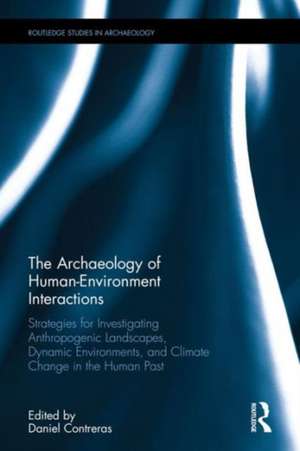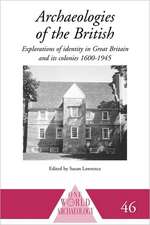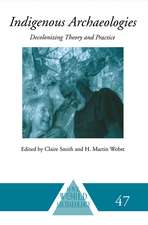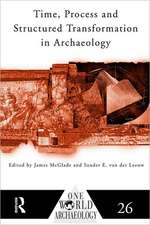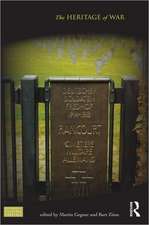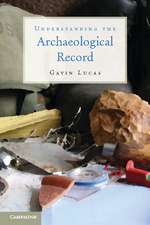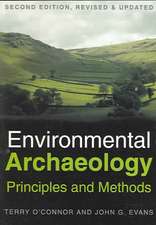The Archaeology of Human-Environment Interactions: Strategies for Investigating Anthropogenic Landscapes, Dynamic Environments, and Climate Change in the Human Past: Routledge Studies in Archaeology
Editat de Daniel Contrerasen Limba Engleză Hardback – 13 sep 2016
This book addresses this challenge by exploring new approaches to human-environment dynamics and confronting the key task of constructing arguments that can link the two in concrete and detailed ways. The contributors include researchers working in a wide variety of regions and time periods, including Mesoamerica, Mongolia, East Africa, the Amazon Basin, and the Island Pacific, among others. Using methodological vignettes from their own research, the contributors explore diverse approaches to human-environment dynamics, illustrating the manifold nature of the subject and suggesting a wide variety of strategies for approaching it. This book will be of interest to researchers and scholars in Archaeology, Paleoenvironmental Science, Ecology, and Geology.
| Toate formatele și edițiile | Preț | Express |
|---|---|---|
| Paperback (1) | 417.59 lei 6-8 săpt. | |
| Taylor & Francis – 10 dec 2019 | 417.59 lei 6-8 săpt. | |
| Hardback (1) | 823.99 lei 6-8 săpt. | |
| Taylor & Francis – 13 sep 2016 | 823.99 lei 6-8 săpt. |
Din seria Routledge Studies in Archaeology
- 18%
 Preț: 643.87 lei
Preț: 643.87 lei -
 Preț: 310.22 lei
Preț: 310.22 lei -
 Preț: 326.26 lei
Preț: 326.26 lei -
 Preț: 342.68 lei
Preț: 342.68 lei -
 Preț: 309.65 lei
Preț: 309.65 lei - 26%
 Preț: 766.16 lei
Preț: 766.16 lei - 18%
 Preț: 1108.37 lei
Preț: 1108.37 lei -
 Preț: 384.59 lei
Preț: 384.59 lei -
 Preț: 483.49 lei
Preț: 483.49 lei - 30%
 Preț: 822.76 lei
Preț: 822.76 lei -
 Preț: 389.38 lei
Preț: 389.38 lei - 25%
 Preț: 773.99 lei
Preț: 773.99 lei - 18%
 Preț: 1062.62 lei
Preț: 1062.62 lei -
 Preț: 423.30 lei
Preț: 423.30 lei -
 Preț: 383.50 lei
Preț: 383.50 lei -
 Preț: 388.34 lei
Preț: 388.34 lei -
 Preț: 383.50 lei
Preț: 383.50 lei - 18%
 Preț: 1108.42 lei
Preț: 1108.42 lei - 18%
 Preț: 1064.70 lei
Preț: 1064.70 lei -
 Preț: 389.38 lei
Preț: 389.38 lei - 18%
 Preț: 1059.14 lei
Preț: 1059.14 lei - 18%
 Preț: 1113.16 lei
Preț: 1113.16 lei - 18%
 Preț: 1114.70 lei
Preț: 1114.70 lei -
 Preț: 492.54 lei
Preț: 492.54 lei - 18%
 Preț: 1109.18 lei
Preț: 1109.18 lei - 25%
 Preț: 769.55 lei
Preț: 769.55 lei -
 Preț: 480.62 lei
Preț: 480.62 lei -
 Preț: 469.34 lei
Preț: 469.34 lei - 25%
 Preț: 767.89 lei
Preț: 767.89 lei - 18%
 Preț: 1072.71 lei
Preț: 1072.71 lei - 25%
 Preț: 770.62 lei
Preț: 770.62 lei -
 Preț: 388.72 lei
Preț: 388.72 lei - 21%
 Preț: 256.87 lei
Preț: 256.87 lei - 18%
 Preț: 1060.52 lei
Preț: 1060.52 lei -
 Preț: 434.63 lei
Preț: 434.63 lei -
 Preț: 485.46 lei
Preț: 485.46 lei
Preț: 823.99 lei
Preț vechi: 1105.19 lei
-25% Nou
Puncte Express: 1236
Preț estimativ în valută:
157.68€ • 168.60$ • 131.46£
157.68€ • 168.60$ • 131.46£
Carte tipărită la comandă
Livrare economică 17 aprilie-01 mai
Preluare comenzi: 021 569.72.76
Specificații
ISBN-13: 9781138901735
ISBN-10: 1138901733
Pagini: 282
Dimensiuni: 156 x 234 x 24 mm
Greutate: 0.68 kg
Ediția:1
Editura: Taylor & Francis
Colecția Routledge
Seria Routledge Studies in Archaeology
Locul publicării:Oxford, United Kingdom
ISBN-10: 1138901733
Pagini: 282
Dimensiuni: 156 x 234 x 24 mm
Greutate: 0.68 kg
Ediția:1
Editura: Taylor & Francis
Colecția Routledge
Seria Routledge Studies in Archaeology
Locul publicării:Oxford, United Kingdom
Public țintă
Postgraduate and UndergraduateCuprins
Introduction
1. Correlation is Not Enough – Building Better Arguments in the Archaeology of Human-Environment Interactions
Daniel A. Contreras
Case Studies
2. Convergence and Divergence as Problems of Explanation In Land Use Histories - Two Mexican Examples
Aleksander Borejsza and Arthur A. Joyce
Alluvial geoarchaeology
3. From the river to the fields: the contribution of micromorphology to the study of hydro-agrosystems in semi-arid environments (Phoenix, Arizona)
Louise Purdue
Micromorphology and agrosystems
4. Regional Climate, Local Paleoenvironment, and Early Cultivation in the middle Wadi el-Hasa, Jordan
Daniel A. Contreras and Cheryl Makarewicz
Paleolandscape Reconstruction in Archaeology
5. Human-Environment Interactions through the Epipalaeolithic of Eastern Jordan
Matthew D. Jones, Lisa Maher, Tobias Richter, Danielle Macdonald, and Louise Martin
Integrating archaeological and palaeoenvironmental data through on-site and off-site stratigraphy
6. Living on the Edge: Pre-Columbian Habitation of the Desert Periphery of the Chicama Valley, Perú
Ari Caramanica and Michele Koons
Landscape Paleobotany
7. A fine-grained analysis of terra preta formation: understanding causality through microartifactual and chemical indices in the Central Amazon
Anna T. Browne Ribeiro
Pedology for Archaeology
8. External Impacts on Internal Dynamics: Effects of Paleoclimatic and Demographic Variability on Acorn Exploitation along the Central California Coast
Brian F. Codding and Terry L. Jones
Spatially Explicit Behavioral Ecology
9. Describing Microenvironments Used for Nomadic Pastoralist Habitation Sites: Explanatory Tools for Surfaces, Places, and Networks
Joshua Wright
Simple Suitability Rasters as Tools for Archaeological Discovery
10. Soil Geochemistry and the Role of Nutrient Values in Understanding Archaic State Formation: A Case Study from Kaupō, Maui, Hawaiian Islands
Alexander Baer
Soil Geochemical Analyses in Archaeology
Discussion
11. Epilogue
Frances Hayashida
1. Correlation is Not Enough – Building Better Arguments in the Archaeology of Human-Environment Interactions
Daniel A. Contreras
Case Studies
2. Convergence and Divergence as Problems of Explanation In Land Use Histories - Two Mexican Examples
Aleksander Borejsza and Arthur A. Joyce
Alluvial geoarchaeology
3. From the river to the fields: the contribution of micromorphology to the study of hydro-agrosystems in semi-arid environments (Phoenix, Arizona)
Louise Purdue
Micromorphology and agrosystems
4. Regional Climate, Local Paleoenvironment, and Early Cultivation in the middle Wadi el-Hasa, Jordan
Daniel A. Contreras and Cheryl Makarewicz
Paleolandscape Reconstruction in Archaeology
5. Human-Environment Interactions through the Epipalaeolithic of Eastern Jordan
Matthew D. Jones, Lisa Maher, Tobias Richter, Danielle Macdonald, and Louise Martin
Integrating archaeological and palaeoenvironmental data through on-site and off-site stratigraphy
6. Living on the Edge: Pre-Columbian Habitation of the Desert Periphery of the Chicama Valley, Perú
Ari Caramanica and Michele Koons
Landscape Paleobotany
7. A fine-grained analysis of terra preta formation: understanding causality through microartifactual and chemical indices in the Central Amazon
Anna T. Browne Ribeiro
Pedology for Archaeology
8. External Impacts on Internal Dynamics: Effects of Paleoclimatic and Demographic Variability on Acorn Exploitation along the Central California Coast
Brian F. Codding and Terry L. Jones
Spatially Explicit Behavioral Ecology
9. Describing Microenvironments Used for Nomadic Pastoralist Habitation Sites: Explanatory Tools for Surfaces, Places, and Networks
Joshua Wright
Simple Suitability Rasters as Tools for Archaeological Discovery
10. Soil Geochemistry and the Role of Nutrient Values in Understanding Archaic State Formation: A Case Study from Kaupō, Maui, Hawaiian Islands
Alexander Baer
Soil Geochemical Analyses in Archaeology
Discussion
11. Epilogue
Frances Hayashida
Notă biografică
Daniel A. Contreras is an archaeologist focused on human-environment interactions in the past, particularly anthropogenic and geomorphic components of dynamic landscapes and environmental change. He pursues these interests in contexts ranging from complex polities in Andean South America and Mesoamerica to early Neolithic societies experimenting with domestication and village life in Southwest Asia. He is currently a LabEx OT-Med postdoctoral researcher in the Institut Méditerranéen de Biodiversité et d’Ecologie (IMBE) and Groupement de recherche en économie quantitative d’Aix-Marseille (GREQAM) at Aix-Marseille Université.
Descriere
The impacts of climate change on human societies, and the roles those societies themselves play in altering their environments, appear in headlines more and more as concern over modern global climate change intensifies. Increasingly, archaeologists and paleoenvironmental scientists are looking to evidence from the human past to shed light on the processes which link environmental and cultural change. Establishing clear contemporaneity and correlation, and then moving beyond correlation to causation, remains as much a theoretical task as a methodological one.
This book addresses this challenge by exploring new approaches to human-environment dynamics and confronting the key task of constructing arguments that can link the two in concrete and detailed ways. The contributors include researchers working in a wide variety of regions and time periods, including Mesoamerica, Mongolia, East Africa, the Amazon Basin, and the Island Pacific, among others. Using methodological vignettes from their own research, the contributors explore diverse approaches to human-environment dynamics, illustrating the manifold nature of the subject and suggesting a wide variety of strategies for approaching it. This book will be of interest to researchers and scholars in Archaeology, Paleoenvironmental Science, Ecology, and Geology.
This book addresses this challenge by exploring new approaches to human-environment dynamics and confronting the key task of constructing arguments that can link the two in concrete and detailed ways. The contributors include researchers working in a wide variety of regions and time periods, including Mesoamerica, Mongolia, East Africa, the Amazon Basin, and the Island Pacific, among others. Using methodological vignettes from their own research, the contributors explore diverse approaches to human-environment dynamics, illustrating the manifold nature of the subject and suggesting a wide variety of strategies for approaching it. This book will be of interest to researchers and scholars in Archaeology, Paleoenvironmental Science, Ecology, and Geology.
